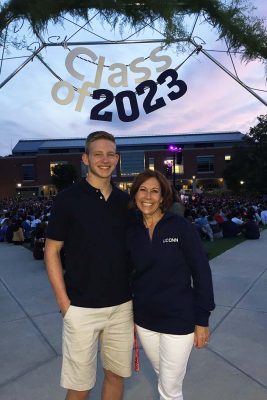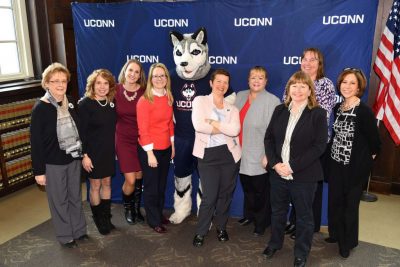
When the pandemic hit, Anne Hill and her team had to uproot the strategies they had been using to design in-person events.
A program specialist for University Events and Conference Services at the University of Connecticut, alumna Anne Hill ’90 (CLAS), ’92 MA, has been planning events across campus for nearly 24 years. When the COVID-19 pandemic hit last spring, Hill and her team had to uproot the strategies they had been using to design in-person events and pivot to online platforms.
In her role, Hill is responsible for coordinating events and conferences at UConn. She also serves as a resource for clients on campus, offering them advice and best practices for event planning. Each year, University Events holds a one-day conference for UConn staff called UConnference. In collaboration with Total Webcasting, a webcasting and content management service, Hill and her colleagues held their first fully online UConnference in July to offer people across campus guidance in planning virtual events amid the pandemic.
“We wanted to show people that this can be done, and it can be done successfully … so people could think about their own programs and imagine what it would look like based on participating in ours,” says Hill.
Celebrating Students and Donors Virtually
Thanks to expert advice from Hill and the University Events team, the Neag School was able to hold the 2020 Scholarship Celebration, one of its signature annual events, virtually this past fall. Hill’s colleague Juliet Kapsis of University Events coordinated with the Neag School of Education to design and implement the program.
Typically held as an in-person luncheon where Neag School donors enjoy an opportunity to meet with the students whose scholarships they have supported, the 2020 virtual celebration brought donors, students, and their guests together with current students, alumni, and administrators for an hour filled with testimonials from student scholarship recipients from as far away as Portugal. It also featured a musical performance by Neag School music education students as well as remarks by UConn alumni and donors Jim and Beth Degnan, both ’87 (CLAS), who shared personal insights into why they have dedicated themselves to supporting the Neag School. Attendees tuned in from around the world.
“The fact that we work with people from all over campus has really been one of the joys for me.”
— Anne Hill ’90 (CLAS), ’92 MA
Later this month, the Neag School will host its 2021 Alumni Awards Celebration virtually as well, coordinated by Lauren Schaller, another representative from University Events.
University Events has been able to pivot many of its other campus events and conferences to an online format and are still finding new platforms and strategies to help keep audiences engaged. Hill says she and her colleagues have since learned there is not a one-size-fits-all approach to virtual event planning, and some events require different platforms or a combination of platforms to be executed effectively.
“It’s similar in many ways to what we were doing in person, but it also requires a lot more script writing and more producing,” says Hill. “It’s become similar to producing a television show in some ways.”

Problem Solving and Relationship Building
In reflecting on her work with University Events and the impact she has had over the years, Hill says that while there are many aspects of the job that she enjoys, the most rewarding is the problem-solving aspects and the relationships she has built with colleagues across the University. Each event she works on comes with different challenges, different personalities, and different rewards.
“While the structure of events can be very similar in the sense of the process that you go through, the fact that we work with people from all over campus and on all campuses has really been one of the joys for me,” says Hill.
For Hill, one of the most memorable events on campus was held in collaboration with Lockheed Martin and the UConn School of Engineering, during which they landed two helicopters on the Student Union lawn.
“In events like that, it’s really the people behind the scenes that make it a success, and we’re able to bring them all together to make the event happen,” says Hill.
Another one of her favorites is the annual gingerbread house decorating competition for faculty and staff that the University Events team organizes annually. The event brings together teams from across the University to get creative and have fun.
“I enjoy working on this and having the event evolve over the years but fostering creativity and collaboration among my colleagues is most rewarding,” says Hill.
Hill has also worked on the Graduate School New Student Orientation in the past, helping them evolve from a standard lecture-based event into a multifaceted event where panels and tours are happening simultaneously, and students can choose the aspects in which they want to take part. Shalyn Hopley, graduate programming assistant and fellow Higher Education and Student Affairs (HESA) alumna, organized the event with Hill for two years, and says Hill was instrumental in sorting out the logistics and creating a space for students to navigate easily.
“Anne was particularly helpful when it came to thinking through how to make the event accessible for our graduate students and how to ask the right questions,” says Hopley.
Adapting to Change as a Higher Education Professional
Hill earned her master’s degree from the Neag School of Education’s Higher Education and Student Affairs program in 1992. She has applied the skills and knowledge she learned not only in her current role, but also in previous roles in higher education and in many different scenarios of her life.
“I am confident that the education and the experiences that I was able to have because … the Neag School prepared me for this path.”
— Anne Hill ’90 (CLAS), ’92 MA
“I am confident that the education and the experiences that I was able to have because of being in the Neag School prepared me for this path,” says Hill.
While much has evolved in the higher education profession since Hill’s time at the Neag School, certain standards reinforced through the program remain the same. HESA director and associate professor, Saran Stewart, came to the University in July and while she does not know Hill personally, she points out that the field of higher education prepares professionals to respond to crisis situations. She describes higher education as a microcosm of society, in which professionals have to respond to all aspects facing social and cultural life.
“I think what Anne has afforded and what should be credited is what she has been able to do in this pivot and the lessons learned from these challenges that are still applicable when we are able to come back face-to-face,” says Stewart. “She has increased equity and accessibility to these kinds of events and programming.”
 Facebook
Facebook
 Twitter
Twitter
 LinkedIn
LinkedIn
